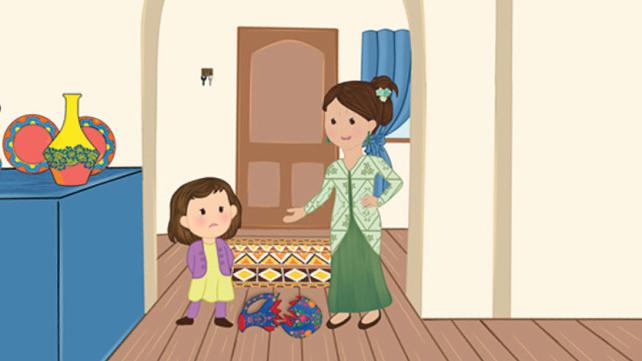
In the realm of children's literature, discovering authentic Muslim representation remains a challenge, especially when it originates from authors who truly embody the Muslim experience. Even less likely is coming across a bilingual children’s book that seamlessly blends multicultural dimensions with Islamic elements in a way that shows instead of tells. You will find all of the above in the new release from Compass Books, Haifa Fixes Her Lie, (Haifa rectifica su mentira in Spanish), written by Sarah Musa, author of the acclaimed My Garden Over Gaza. Through vibrant storytelling, this colorful early reader illustrated by Humaira Saud details how even big mistakes like lies can be mended when we are brave enough to seek forgiveness.
The narrative follows Haifa, a playful young girl whose carelessness leads to a broken vase, setting off a chain of events that unfolds with both innocence, humor, and valuable life lessons. As Haifa grapples with her initial lie and witnesses her uncle, Tio Orlando, rectify his own inadvertent mistakes, readers are immersed in a heartfelt journey of self-discovery and redemption through a child’s eyes.
Haifa’s curiosity gets the best of her when she is admiring her mother’s prized gift, a beautifully decorated ceramic vase handcrafted by her uncle, Tio Orlando. When Haifa’s mother finds it shattered on the floor, she asks her daughter what happened. Afraid to admit that she accidentally caused it to fall, Haifa denies involvement and keeps her guilt a secret. Her mother reminds her that lies are sinful, but despite her warnings, Haifa remains silent. Her lie weighs heavily on her heart throughout the story.
Tio Orlando comes over for a surprise visit and spends the day playing with Haifa, making her forget about her lie temporarily. While they are enjoying their time, Tio Orlando accidentally steps on Haifa’s favorite pen and crushes it under his weight. He also breaks the vacuum cleaner as he helps tidy the house. Tio apologizes to both Haifa and her mom. He rectifies his mistake by fixing the vacuum cleaner and helping her with other chores. Haifa sees in her uncle an example of good character and is reminded about the lie she told. She realizes that she should also apologize. One by one, Haifa offers apologies – first to her uncle for breaking the vase he made, second to her mother for lying, and finally to Allah. Once she admits her wrongdoing and seeks forgiveness, she feels much better and vows never to lie again.
What sets this book apart is its "own voices" perspective, subtly weaving cultural and religious elements into the narrative without resorting to excessive exposition. The story is endearing and relatable, portraying a scenario that mirrors everyday occurrences in the lives of children. With an Arabic name for Haifa and a Spanish name for Tio Orlando, the story subtly hints at their multicultural identities. However, the author wisely leaves room for readers to speculate about their background and family dynamics. This intentional ambiguity encourages children to either engage their imagination or find elements of their own background reflected in the characters. Additionally, the narrative is not overly preachy, offering an authentic portrayal of Muslim family life that is both proud and understated.
The author, Sarah Musa, is half Palestinian and half Latina from her mother’s side. Her own Tio by the name of Anthony was an inspiration for this book. His name is mentioned in the dedication and author bio. Musa fondly remembers the impact he had on her life before losing a battle with cancer at a young age. Through Haifa’s story, she honors her uncle, as well as her Latin American roots. Musa describes her heritage as “half of who I am” despite at times not feeling completely accepted in that community. She recalls that growing up, it was difficult to fit into the Latino culture because there was not a significant presence of Latino Muslims in her home state of New Mexico. With the ever-growing number of Latin American Muslims in Islam today, and Musa’s contribution to Latino representation in Islamic literature, hopefully that will change.
Haifa Fixes Her Lie is a delightful early reader that is sure to captivate children and resonate with its relevance. For Spanish-speaking families and those seeking more inclusivity in Islamic kidlit, this book stands as a useful addition, promoting cultural appreciation and embracing the diversity within the Muslim community. While I noted some minor translation errors, the narrative remains comprehensible in both languages, providing a valuable option for bilingual and multilingual families. There are also statements throughout about Allah not “liking people who lie” that may need further elaboration from parents who are reading to their children.
All things considered, Sarah Musa's work is an invitation for readers of all backgrounds to explore, learn, and celebrate the richness of everyday Muslim life through the eyes of Haifa and Tio Orlando. I look forward to reading more from Musa and Compass Books in the future, inshaAllah, God willing.
Wendy Díaz is a Puerto Rican Muslim writer, award-winning poet, translator, and mother of six (ages ranging from infant to teen). She is the co-founder of Hablamos Islam, a non-profit organization that produces educational resources about Islam in Spanish (hablamosislam.org). She has written, illustrated, and published over a dozen children’s books and currently lives with her family in Maryland. Follow Wendy Díaz on social media @authorwendydiaz and @hablamosislam.



Add new comment